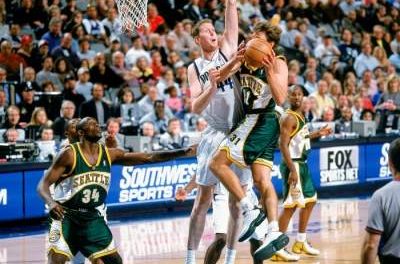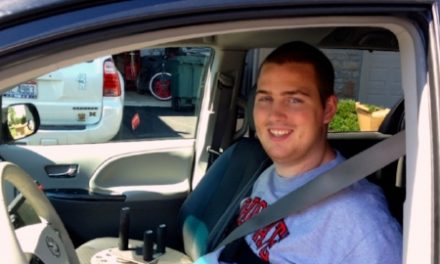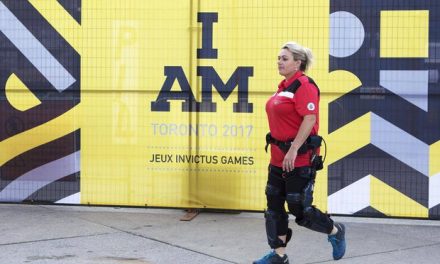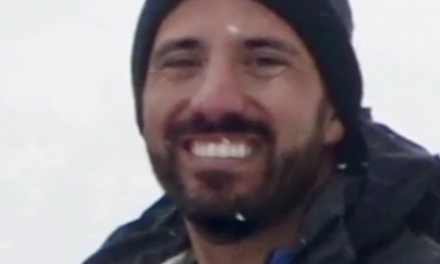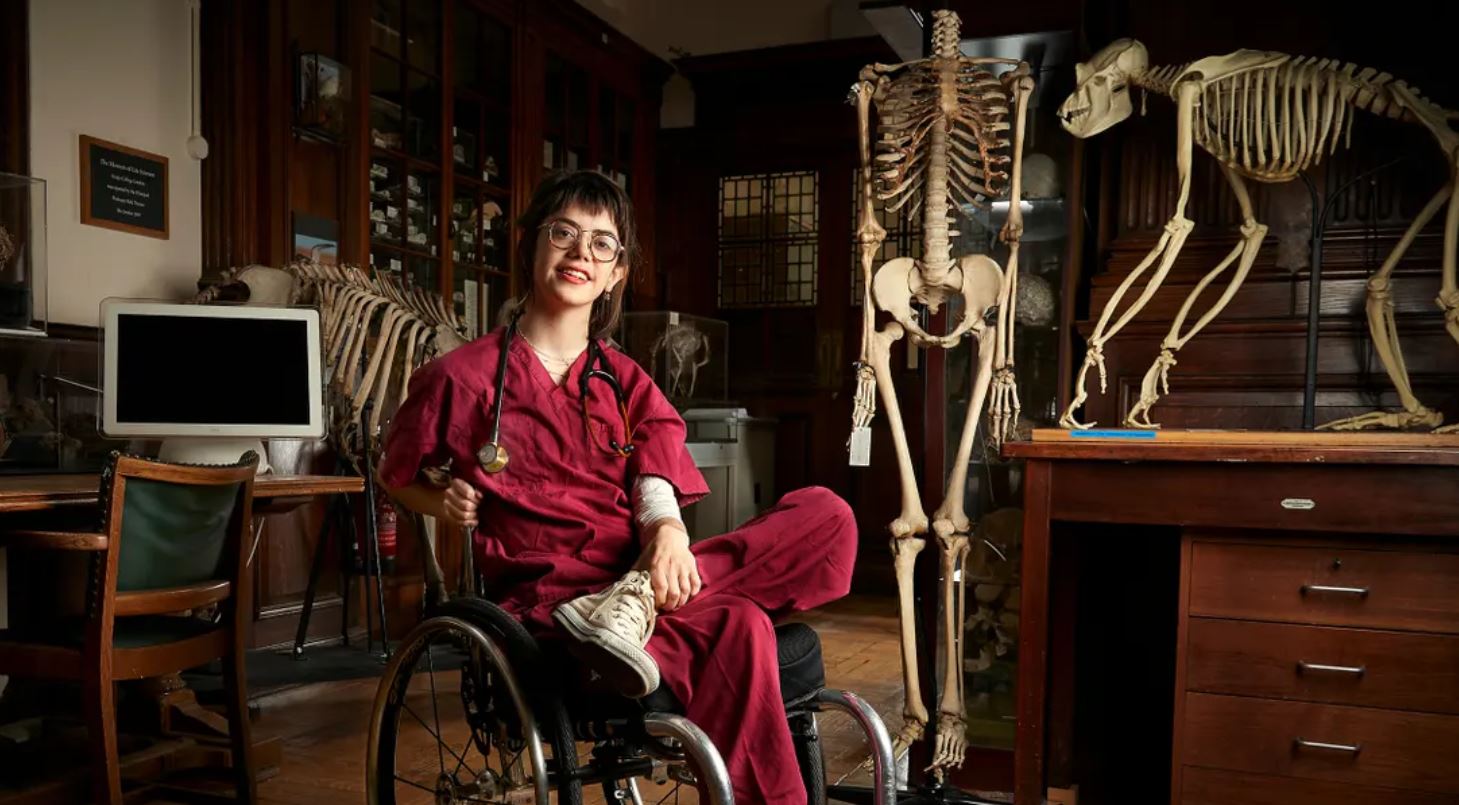
Her life changed instantly when she was crushed at a shopping centre. But through radical acceptance she gained friends, greater empathy and a passion for changing people’s perspectives
It helps to think of it as the day she saved someone else’s life. That it has brought Grace Spence Green many other positives – increased empathy, good friends, a new perspective – is what she thinks about often, even if she also describes it as “the most traumatic day of my life”.
On an October afternoon in 2018, she was walking through Westfield shopping centre in east London at the precise moment a man three floors up decided to jump. He landed on Spence Green, breaking her back, injuring her spinal cord and fracturing her neck. It was surreal, she says, to wake up “when I didn’t think I was asleep”.
For the first couple of weeks, her medical team was just trying to get her stable. Then Spence Green was moved to the London Spinal Cord Injury Centre at the Royal National Orthopaedic hospital in Stanmore. Although she was a medical student, Spence Green hadn’t realised what a life-altering injury she had experienced. There was the denial: “You never think you’re going to be the one that gets this sort of injury. I just felt like: ‘Well, no, this isn’t me, I’m not meant to be in a wheelchair,’” she says. There was the fact that her injury was “bloodless, in a way. I had no bruises, no cuts, scrapes, anything. I thought: ‘I look the same.’ Obviously, I couldn’t see the giant scar down my back.”
She had had an eight-hour operation on her spine. The first time a doctor showed Spence Green her MRI scans, squashed in a room with her parents and her boyfriend, Nathan, it was “the first time I really was faced with the reality”, she says.
When we speak via video call, Spence Green is sitting in her kitchen in her flat in London. She grew up in the north of the city; her parents are academics. She sparkles with a kind of calm but intense energy, even when remembering what she describes as her lowest point, when doctors told her she would not be able to walk again. “I remember getting out of that meeting and just crying, folded up on my lap. I went outside, because I wanted to breathe, and it was pouring down with rain.” Her family went home and she remained in hospital, dealing with this news and contemplating a future that felt extremely bleak – because this was what she thought life as a wheelchair user would be.
In the two and a half years since, Spence Green has had to unpick a lifetime of negative messages about disabled people. Now, as one of the hosts of the podcast This Is Spinal Crap – all about people living with spinal injuries – she is focused on showing that the very fact of her “existing – living a happy, normal life – is activism in itself”.
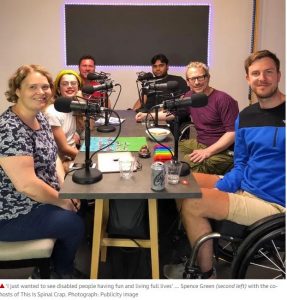
Not that it has been easy. At the beginning, it felt like a “huge loss. I couldn’t imagine myself having a good life in a wheelchair, because I just don’t think there are enough examples of that anywhere. The only thing that kept me going was the fact I knew I was going back to medicine [she deferred her studies by a year]. I clung on to that because it was part of my identity from before my injury.”
The publicity surrounding the incident was also difficult to deal with – especially other people’s views on how she must have felt. The man who landed on her was later sentenced to four years in prison after admitting grievous bodily harm; he didn’t suffer any serious physical injuries. “When people hear my story, it’s so framed as a victim and a perpetrator, and that it’s tragic what happened to me and I will always be a victim,” she says. “It just got exhausting hearing people’s anger.”
She was shocked at some people’s anger towards her in online comments “for not displaying the emotion they thought I should”; they thought she ought to be consumed with anger and bitterness. “I had people saying I was in denial and that I was secretly angry and things like that. It just made me think there’s always going to be people that think my life is a tragedy, that my life is ruined, and I just have to accept that.” She laughs at the absurdity of it.
She says her story also exposes thinly veiled racism (the man who jumped is black) and strong feelings about drug use (the judge at his trial attributed his behaviour to the consumption of cannabis): “There are a lot of things going on when people react to my injury.”
A lot of people would feel anger, though, or at least self-pity. Did she never feel either of those emotions? “There was never any anger, no. There was sadness at the beginning and there was definitely some kind of: ‘Why me?’” There were a lot of what-ifs: what if she hadn’t taken that route through the shopping centre? “But I find it so exhausting, and I hate feeling like a victim and self-pitying, because it doesn’t feel like it gets me anywhere. Now I look at it and I feel completely disconnected to him. That’s what I also find strange – people ask: ‘Are you going to meet him?’ like for some reason we’re still associated. It’s difficult having so many other opinions put on you.”
She has said before that thinking she saved his life, or that someone else he could have landed on – a child, for instance – might not have survived, helped her start to come to terms with what happened. “Looking at that quite practically was really helpful to me in the beginning, because I thought: ‘If I did save this life, then I wouldn’t change what happened.’”
It took about a year, she says, to get to a point approaching peace with what had happened. “I’d call it radical acceptance, because I really had to embrace being disabled,” she says. “As soon as that happened, my whole perspective changed, because as soon as I felt proud of who I was I just didn’t take people’s crap any more. I didn’t take people’s pitying or ableist comments, or feel like I needed to answer to people about who I was and what I was doing. But it took a long time to get there.”
She had started following disabled people and activists online and read a lot about disability studies. “I realised that everything I’d been told was society’s narrative of how a disabled person should be and I didn’t need to be like that. Instead, I could actually be a normal person and accept my injury and actually really love being disabled and what it brings.”
 Spence Green’s injury is “incomplete”, which means she can have flickers of sensation and movement, but she rails against a focus on learning to walk again (it remains unlikely). The idea of this being the “miracle cure”, she says, “fits with society’s vision of what a disabled person should be like – they shouldn’t be happy being in a wheelchair, they should be striving to walk again”. The flipside of this, she says, is that “they should be a Paralympian and their disability should be their magic power. Or that they need to overcome it in some way, by some physical feat. It’s the idea that you can’t just be a normal person and be content in a wheelchair. I still think it really shocks people that I can be happy.”
Spence Green’s injury is “incomplete”, which means she can have flickers of sensation and movement, but she rails against a focus on learning to walk again (it remains unlikely). The idea of this being the “miracle cure”, she says, “fits with society’s vision of what a disabled person should be like – they shouldn’t be happy being in a wheelchair, they should be striving to walk again”. The flipside of this, she says, is that “they should be a Paralympian and their disability should be their magic power. Or that they need to overcome it in some way, by some physical feat. It’s the idea that you can’t just be a normal person and be content in a wheelchair. I still think it really shocks people that I can be happy.”
She remembers feeling pity for wheelchair users before she was one. “I remember being really awkward around people with visible disabilities and feeling like if I smiled at them, or helped them with the door, then they’d feel grateful to me and happy that I’ve helped them. Looking back, I’m so embarrassed by myself.” She laughs. “It was really shocking.”
People try to help her now and she sees the good intentions, but it is frustrating. “Sometimes I just accept it, but it bothers me when it’s someone continually not accepting that I know my needs better. I will be like: ‘I can do this door,’ and they’re: ‘No, no, I’ll get it.’ I’ll have to say three times: ‘I don’t need help.’ A lot of able-bodied people think they know your needs better than you do.”
Wearing her scrubs in hospital as a medical student makes her feel confident and she has never had any issues with patients. “But with colleagues it can be difficult,” she says. She has been getting taxis to work; drivers invariably assume she is the patient, not the doctor. “Just because I’m in a wheelchair, I’m not a for ever patient,” she says, wearily. These days, she is straight with people. “I’m much fiercer than I used to be; I’m getting better at sitting in other people’s discomfort. I think I used to want to make people feel OK and I’d make jokes about myself to make them feel more comfortable.”
It is strange, she says, that some people are surprised her relationship with her boyfriend has lasted (they have been together for five years). “I don’t think disabled people are seen as sexually active adults – we’re this kind of neutral, asexual being that can’t have relationships and families and things like that. That was another great thing about going online and seeing all these disabled mums and dads; that really encouraged me. I think, again, it’s because we don’t see disabled relationships anywhere.”
We need much better representation, of course. While This Is Spinal Crap covers serious issues, the podcast has a funny and upbeat tone that, in the mainstream, at least, feels radical. “I think I’ve really tried to reject that victim image,” she says. It would have helped her, when she was recovering, to listen to something like her podcast. “I think that’s why all of us decided to do it, because there was nothing out there that we could find. There’s a lot of videos of disabled people showing how to do practical things, but I just wanted to see disabled people having fun and living full lives.”
Spence Green starts work as a junior doctor this summer. Her ultimate aim is to work in paediatrics, especially with disabled children, “because I think they don’t get enough of a voice for themselves”. There are still times when she experiences grief at what she has lost, she says, but it isn’t helpful to dwell on it. “I used to just be like: ‘I’d be happy if I could walk again.’ And I don’t think that’s true, so I’ve started to reframe desire into what’s good for me: what makes me feel good? I think you can focus on what you lack in life: ‘If I had this, then I’d be happy.’”
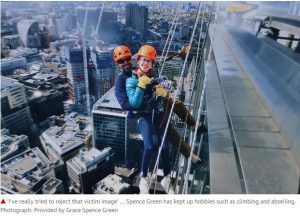 Instead, she concentrates on what she has gained – a wealth of new experiences, friends and perspectives. “Talking about disability and advocating for disabled people has become something I’m so passionate about. Without my injury, I wouldn’t have that,” she says. “I’d really like to keep talking about this and, especially when I start as a doctor, I think I’ll have more to say. I’m really positive about making hospitals more accessible, especially for colleagues.”
Instead, she concentrates on what she has gained – a wealth of new experiences, friends and perspectives. “Talking about disability and advocating for disabled people has become something I’m so passionate about. Without my injury, I wouldn’t have that,” she says. “I’d really like to keep talking about this and, especially when I start as a doctor, I think I’ll have more to say. I’m really positive about making hospitals more accessible, especially for colleagues.”
About 20% of the UK population is disabled, but it is thought only about 2% of doctors are. “I really want to start empowering younger disabled people, who might not think they can do medicine because they haven’t seen anyone like them,” she says.
She will be a different – better – doctor from the one she would have been without the injury, she thinks. “I now understand what it’s like to feel vulnerable in hospital and how important it is to make patients feel not only well again, but also safe. It’s made me face my own ableist views and think about quality of life in a different way. Just because someone might be nonverbal, it doesn’t mean they have a lack of autonomy, that they don’t want to have some independence, that they can’t have a fulfilled life.”
She wants to empower her patients to take more control of their treatment. “I really remember the good experiences I had as a patient with doctors – and the terrible experiences, where you felt like you didn’t really have a say.”
Spence Green has been called “inspirational” a lot, she says. It is easy to see why – she seems to have enormous reserves of generosity, resilience and positivity – but it can have a patronising undertone. “Disabled people get called inspirational for just going to the shops. I think it stems from this idea that able-bodied people think disabled lives are so horrible, that as soon as we do something ordinary it’s extraordinary. Are you inspired by me to work towards more accessible futures? Is this inspiration going to lead to a ramp? Or are you just inspired because it makes you feel better about yourself because you’re not in my position?”
Life did not become small for Spence Green, as she had first feared. The injury has “changed everything about me … people don’t understand, but I wouldn’t take back my injury, I don’t think, because it’s made me who I am.” She is stronger, she says. “I used to let people walk over me a bit more.”
It has given her a broader perspective on life. “I was 22 years old, with this ignorance of how other people live. I grew up very privileged, a young white woman, middle class. I understood there were barriers out there for other people, but once you’ve lived through them you can really understand what it’s like.”
If many people do still underestimate, patronise or look past her, it is equally true that her injury has allowed her to connect with people. “Because my wheelchair is so obvious, it’s like a very visible scar, I see people really open up to me. They recognise that I’ve been through something.”
by Emine Saner
Originally published in The Guardian

